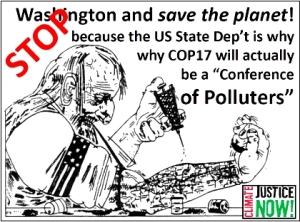 Earlier this week, David Harvey appeared on a panel about contemporary Land Grabs along with activists Somnath Mukherjee, Smita Narula, Kathy LeMons Walker. I unfortunately was not able to attend. In searching fruitlessly for a video of the event, I nonetheless came across some interesting materials online.
Earlier this week, David Harvey appeared on a panel about contemporary Land Grabs along with activists Somnath Mukherjee, Smita Narula, Kathy LeMons Walker. I unfortunately was not able to attend. In searching fruitlessly for a video of the event, I nonetheless came across some interesting materials online.
The first is a video of a talk David Harvey did with Medha Patkar, founder of the anti-dam organization Narmada Bachao Andolan (Save the Narmada Campaign), and founder of the National Coalition of People’s Movements. This was a fascinating dialogue between a key activist working to roll back land grabs and an theorist who provides an incredibly important overview of capitalism’s strategies of accumulation by dispossession, of which land grabs are a key strategy. Here’s the video:
[youtube=http://www.youtube.com/watch?v=P_Ia93DURSY]
I also came across a really interesting blog post by Raj Patel that analyzes a 2010 World Bank report on Land Grabs.
Last of all, I came across my own transcript of the discussion between Harvey and Patkar (I attended the event, which was held in an Occupy-aligned space near Wall Street). Here’s a link to my transcript.
From the perspective of a cultural critic, I want to ask what forms of hegemony need to be established in order for these sorts of land grabs to take place. Part of the problem may be that many of these activities remain invisible to most of the public in imperial nations such as the U.S. In this context, it might be worth recalling Fredric Jameson’s argument in Nationalism, Colonialism, and Literature that colonialism shifted a significant structural segment of the economic system overseas, beyond the metropolis, outside the quotidian experience of imperial subjects, rendering significant segments of everyday life unknown and unimaginable for these subjects.
But while Jameson’s point may make some sense in relation to land grabs, I think it’s important to see such strategies of accumulation by dispossession in a broader context, as part of an ensemble that includes free trade agreements, Structural Adjustment Policies, transnational flows of migrants, food riots, and uprisings such as the Arab Spring. So ultimately I think a position such as Edward Said’s in the same volume as Jameson makes more sense: to see the anxiety that permeates much modernist (and contemporary) cultural production as a product of the troubling of fixed borders that results from empire. It is probably also worth thinking about land grabs as part of a broader cultural of uneven development. Bret Benjamin’s Invested Interests is an important investigation of the culture of contemporary accumulation by dispossession. I’m sure there are other examples of cultural studies work along these lines. I’d love to hear suggestions…

